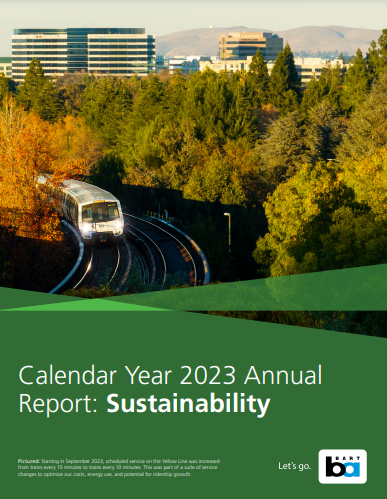BART's 2023 Sustainability Report highlights agency's innovation and improvements to rider experience

BART continued in 2023 to pioneer sustainability initiatives aimed at enhancing rider experience while prioritizing environmental stewardship. With a legacy rooted in forward-thinking transportation solutions, BART reaffirmed its commitment to reducing carbon footprints and advancing sustainable transit practices. The accomplishments of 2023 are detailed in the annual Sustainability Report, officially presented to the Board of Directors on July 11, 2024.
"BART’s sustainability efforts were all about innovation in 2023," said BART Board President Bevan Dufty. "We are dedicated to integrating creative solutions that not only improve the rider experience, our immediate priority, but also emphasize long-term sustainability."
Established over fifty years ago with a vision to alleviate regional traffic congestion through eco-friendly transit options, BART has continually evolved its practices to reflect contemporary environmental standards. Notably, engineers initially opted to power trains with electricity rather than fuel, a decision that laid the foundation for ongoing sustainability achievements.

In a poignant farewell to its legacy fleet, BART hosted a memorable "retirement party" in February 2024, marking the culmination of efforts to retire older vehicles. Thousands of attendees gathered to bid farewell to the trains that had served millions of passengers over the years. The decommissioned cars are being repurposed for various projects, including a BART car short-term rental in the Sierra Nevada and a youth bike shop and clubhouse in East Oakland, demonstrating BART’s commitment to sustainability beyond transit operations.
The introduction of new, energy-efficient train cars has furthered BART's sustainability goals, boasting a 7% reduction in energy consumption compared to previous train car models. By running shorter trains during off-peak hours, BART has achieved significant energy savings. 88% of BART’s electricity comes from greenhouse gas-free sources like solar, wind, and hydropower.
"Our shorter trains not only save energy and reduce costs but also enhance safety and efficiency in maintenance," BART General Manager Bob Powers added. "These innovations underscore our holistic approach to sustainability across all facets of our operations."
In addition to transit improvements, BART expanded its Transit-Oriented Development (TOD) program, constructing 531 new housing units near BART stations. Projects like the Gateway at Millbrae Station and the Upper Yard at Balboa Park Station not only address regional housing needs but also promote sustainable urban development and economic revitalization.
Highlighting unique environmental initiatives, BART's Sheep and Goat Fire Mitigation program has grown substantially, utilizing over 500 grazers to mitigate fire risks across its properties. Meanwhile, the Falconry-Based Nuisance Bird Control program, now implemented at 12 stations, effectively manages pigeon populations through pesticide-free methods.
For more information on BART's sustainability initiatives and ongoing projects, visit bart.gov/sustainability.